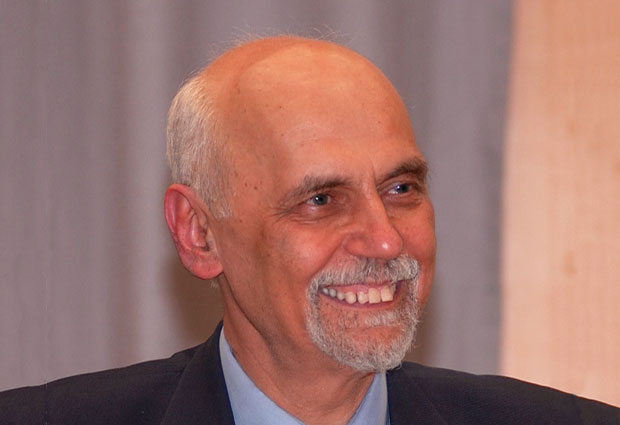
Obituary: Fotis Kafatos
Fotis Kafatos, EMBL’s third Director General, has passed away

It is with great sadness that EMBL learned of the passing of Fotis Kafatos, former EMBL Director General, who died on Saturday 18 November at the age of 77.
Fotis was EMBL’s third Director General from 1993-2005 and afterwards became the founding president of the European Research Council, as well as a member of its Scientific Council from 2005-2010. Fotis’ contributions to science and the scientific community over five decades in the US and Europe had a significant influence on the advancement of molecular biology on both sides of the Atlantic.
Fotis had a rare ability to bring together people, ideas and disciplines
Before joining EMBL, Fotis became a Professor of biology at Harvard University at the age of 29, the youngest full professor in the University’s history. In particular he was among the first to apply molecular biology along with genetics to study animal development. His group also developed important techniques in DNA synthesis, cloning and sequencing that were widely adopted. While at Harvard, Fotis remained very committed to European science, founding and directing the Institute for Research and Technology, Research Centre of Crete between 1982-1993.
Fotis had a rare ability to bring together people, ideas and disciplines. During his time at EMBL he applied his skills to work passionately towards accomplishing three major goals: excellence, inclusiveness and cooperation. Fotis led the establishment of the Developmental Biology Unit at EMBL in Heidelberg and the Mouse Biology Unit in Rome (now the Neurobiology and Epigenetics Unit), as well as pursuing the conversion of the Data Library into EMBL-EBI, a move that had been decided under his predecessor but was largely implemented under Fotis’ leadership. He drove the development of core facilities, training, outreach, technology transfer, industry collaboration and many ground-breaking pan-European research initiatives, which have transformed the way life scientists around the world work together.
The scientific community has lost a deeply caring colleague, friend and leader
During his tenure at EMBL, Fotis continued to carry out his own research, focussing on the study of malaria and its major insect vector, Anopheles gambiae. This work led to the sequencing of the A. gambiae genome and opened new avenues of study regarding the malaria parasite and its interactions with its insect host. Fotis also led studies on the Drosophila genome and is recognised as a pioneer in the development of comparative and functional genomics. In 2005, Fotis took up a position at Imperial College London, where he held the Chair of Insect Immunogenomics. He was elected as the first President of the ERC in 2007.
“Fotis had a huge impact at EMBL and the life sciences in general – the scientific community has lost a deeply caring colleague, friend and leader,” says Iain Mattaj, EMBL Director General. “Fotis established two new EMBL units, he drove the reorganisation and expansion of PhD training and introduced the EMBL partnership scheme, amongst a multitude of other successes. But he was also a very approachable person, and what struck me most about him was his warmth, a feeling that was returned by all who knew him. Our thoughts are with Fotis’ wife Sarah and his family at this time.”
Prize for young researchers set up in honour of Fotis Kafatos
Colleagues of Fotis have created the Fotis Kafatos Prize for Excellence in Biology, which is to be awarded to the most promising young Greek researchers working in the life sciences anywhere in the world. Candidates will be carefully chosen based on merit, and its purpose – to recognise and support outstanding young scientists – is just what Fotis would have wanted. Donations towards the prize, which is also supported by the Greek Ministry of Science, can be made to the following account:
Pireaus Bank
Account number: 6749 -113614- 229
IBAN: GR29 0171 7490 0067 4911 3614 229
Account owner: The Pan-Greek Union of Biological Scientists
EMBL is putting together a condolence book. If you would like to add your messages, memories and stories to this please send a message to alumni@embl.org.


